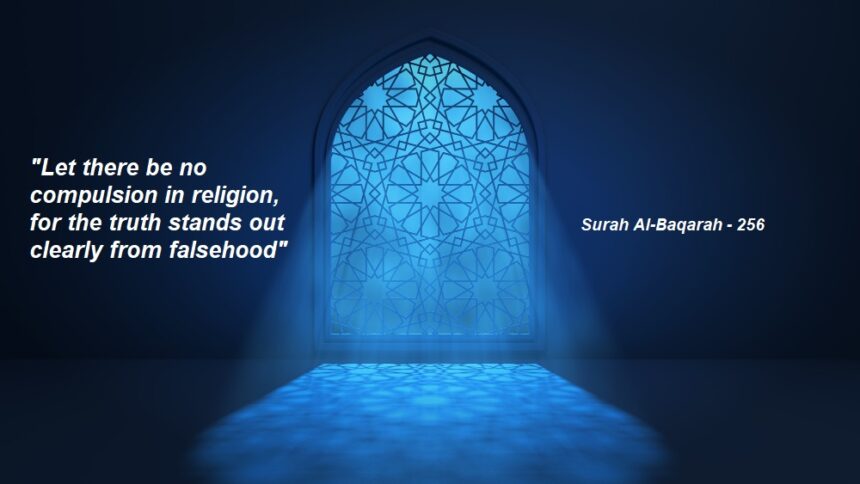Overview
Islam is a faith that supports the values of freedom, fairness, and individual responsibility. “La Ikraha Fid Din” (لَا إِكْرَاهَ فِي الدِّينِ), which translates to “There is no compulsion in religion,” is one of the most deep and often cited lines from the Quran that best captures this philosophy (Surah Al-Baqarah 2:256). The basic idea that faith is a matter of conviction and free choice rather than coercion is established in this verse. The meaning, importance, and ramifications of this verse in Islamic law, theology, and social government will all be discussed in this article.
Understanding the Background of “La Ikraha Fid Din”
When Islam was growing in power, the verse (Surah Al-Baqarah 2:256) was revealed in Medina. It speaks to a fundamental tenet of Islamic doctrine: people cannot be compelled to accept their faith; it must be freely chosen. According to the historical background, several Medina families had children who were not Muslims, and as Islam was developing, parents were unsure if they should force their kids to convert. This verse made it clear that comprehension and genuine acceptance, not coercion or pressure, must be the foundation of believing.
Theological Significance of the Verse
- Freedom of Faith: Islam acknowledges and upholds a person’s right to select their own religion. The Quran makes it clear time and again that Allah is the source of instruction and that no one has the right to force their religion on others.
- Personal Responsibility: Each person is responsible for their own beliefs and deeds. Since belief is a matter of the heart, it must originate from sincere conviction and cannot be forced from without.
- Respect for Diversity: Islam recognizes that individuals come from a variety of religious backgrounds and that diversity is a component of God’s divine design. This idea is further supported by Surah Al-Kafirun 109:6, which states, “To you is your religion, and to me is mine.”
Implications in Islamic Law (Shariah)
- No Forced Conversions: The core principles of Islam are incompatible with forced conversion. Non-Muslims were offered the option to convert to Islam, stay in the Muslim region under protection (Dhimmi status), or depart even during Islamic conquests.
- Legal Protection for Non-Muslims: Under Islamic law, the idea of Dhimmah guaranteed that non-Muslims might freely profess their faith without worrying about retaliation.
- Religious freedom and apostasy: Although some scholars view apostasy (Riddah) as a crime, others contend that the Quran makes no mention of any material penalties for converting to Islam, highlighting that only God has the authority to judge.
The Verse in the Context of Hadith and Prophetic Traditions
The idea of religious freedom is further supported by the life of the Prophet Muhammad (PBUH). His dedication to maintaining faith as a matter of personal preference is evident in a number of instances:
- Treaty of Medina: The Prophet (PBUH) signed the Treaty of Medina, which guaranteed religious freedom and safety for both Jewish and pagan tribes.
- Letters to Rulers: The Prophet (PBUH) never used force to threaten emperors or monarchs, but he did extend an invitation to Islam.
- The Case of a Christian Boy: The Prophet (PBUH) respected the Christian boy’s right to choose and did not force him to convert to Islam when he became unwell.
Relevance of “La Ikraha Fid Din” in the Modern Era
- Interfaith Harmony: In today’s pluralistic cultures, the idea of religious freedom is crucial to promoting harmony and cohabitation.
- Human Rights & Freedom: A large number of international human rights legislation protect the right to freedom of belief and expression and are consistent with the Quran’s teaching that religion should not be forced.
- Problems with Extremism: Coercion and persecution in the name of religion have resulted from misunderstandings of Islamic beliefs. However, radical ideologies are refuted by the Quran’s position that faith is a personal affair.
In conclusion
A pillar of Islamic doctrines, the verse “La Ikraha Fid Din” emphasizes the need for respect for diversity, individual choice, and religious freedom. Islam respects people’s inherent worth and forbids coercion in religious matters. In fostering justice, peace, and tolerance in society, this idea continues to serve as a beacon for both Muslims and non-Muslims.
We may promote a society that honors individual convictions and preserves the genuine essence of Islam—one of kindness, knowledge, and fairness—by comprehending and accepting this Quranic mandate.



